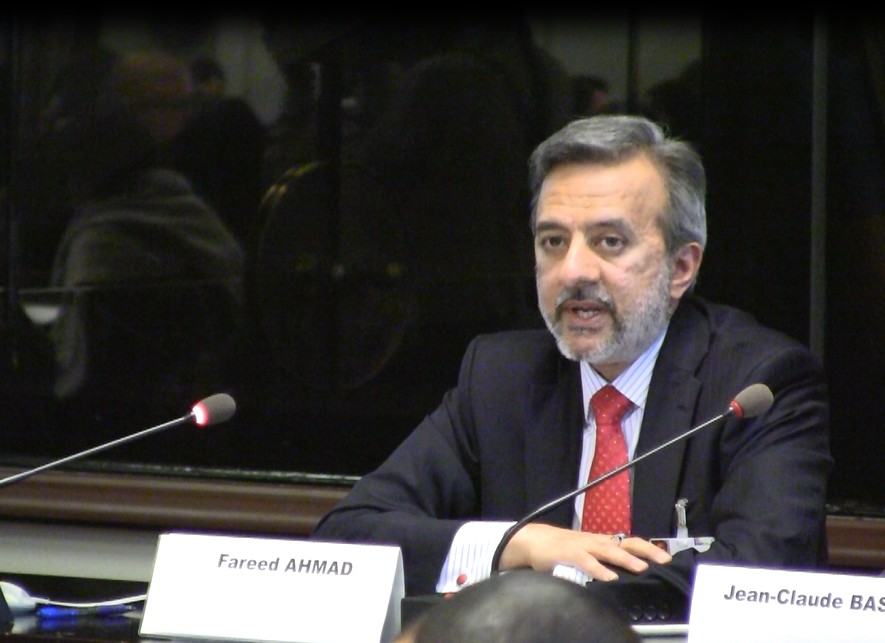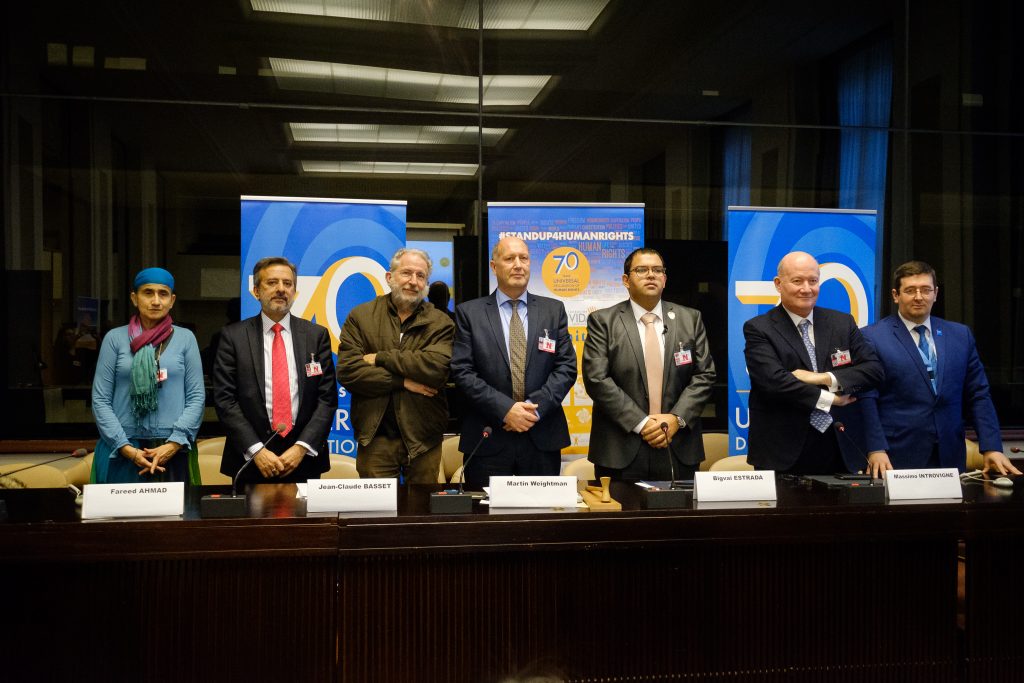Fareed Ahmad, Ahmadiyya Muslim Community UK
 I am honoured to attend this historic event hosted by CAP Liberté de Conscience and other partners to mark the 70th Anniversary of the Universal Declaration of Human Rights.
I am honoured to attend this historic event hosted by CAP Liberté de Conscience and other partners to mark the 70th Anniversary of the Universal Declaration of Human Rights.
I would like to touch on how our faith and our faith community has played a role in the promotion of human rights.
Islam, from the very outset has championed this cause – as can be seen in the famous Farewell Sermon of the Holy Prophet of Islam. He said :
“As God has made you one brotherhood, so be not divided. An Arab has no superiority over a non Arab, nor a non Arab over an Arab; nor is a white person superior to a dark person, nor a dark person superior to a white person.”
Similarly the Holy Quran has defined key human rights principles as fundamental to peace for all human beings – such as the sanctity of life, the provision of food and shelter and freedom of religion and conscience for all.
On the latter the Quran states in Chapter 2 v 257 that ‘There should be no compulsion in religion’
Continuing this tradition, the Ahmadiyya Muslim community has always played a key part in the promotion of human rights and the UDHR.
In fact the Ahmadiyya Muslim Community has been at the forefront of promoting human rights ever since its inception.
The founder of the Ahmadiyya Muslim Community, Hazrat Mirza Ghulam Ahmad, – whom we accept as the Promised Messiah and Imam Mahdi – summarised this by emphasising that in essence there are two key components to Islam and they are the duty we owe to God (through worship and remembrance) and the duty we owe to God’s creation. In this is captured the fundamental principle of protection of human rights for we cannot fulfil our duty to God’s creation without upholding those rights we owe to all mankind.
This emphasis on human rights has been upheld by all the Caliphs – ie spiritual successors of the founder of our community – and the present Caliph His Holiness Hazrat Mirza Masroor Ahmad who is based in London – has repeatedly highlighted the need for absolute justice, freedom of religion and human rights.
The reason this is important is that this emphasis is then carried right through our global community – that is now established in 210 countries – and in all its work.
In our work and peace campaigns the values and principles of the UDHR are self-evident, for example through the speeches of His Holiness at Parliaments across the world, and through our interfaith work where we build bridges with other communities to unite for the cause of humanity. A good example is our annual National Peace Symposium where different faith leaders, political speakers and NGOs highlight the need for human rights and peace.
We also have an extensive campaigns that bring together NGOs to advocate for human rights and our youth – and indeed our elders – do excellent work in putting the UDHR values into practice by driving change through supporting other NGOs eg through fundraising that help to deliver life chances for people. This year we raised more than £1.5m in the UK alone.
We give countless talks in schools, engage with Parliamentarians for example through our UK All Party Parliamentary Group for the Ahmadiyya Muslim Community or the Friends of Ahmadiyya Muslims Group in the EU we leverage these to raise our voice and the voice of others to speak up for human rights.
We also run extensive counter extremism campaigns through leafleting, media campaigns and policy events in public institutions such as the UK Parliament and EU Parliament to drive home the message that extremism has no place in Islam and is an anathema to faith more widely, making it a common challenge for us all. This education programme has been very successful in enhancing the understanding of police and other authorities and is used again to highlight how a human rights based approach can be critical in bringing people together on a common platform. To work together we must trust each other, and education is key.
As mentioned earlier our support for UDHR is nothing new in this field and one example is how a very prominent member of our community Sir Muhammad Zafruallah Khan – who was Pakistan’s first Foreign Minister, the President of the UN General Assembly and President of the International Court of Justice at the Hague – how he championed the cause of UDHR from the outset as a key contributor to the UDHR when it was drafted. I quote a former Special Rapporteur for Freedom of Religion or Belief, Prof Heiner Beilefeldt who said,
“In 1948 when the UDHR was under discussion the then Foreign Minister of Pakistan, Muhammad Zafrulla Khan, a member of the Ahmadiyya Muslim Community, took the podium and delivered a speech in the plenary session of the General Assembly of the United Nations, fully endorsing freedom of religion of belief, including its component of change. He gave a very powerful speech.”
This spirit of promoting the UDHR is part and parcel of our work as this is reflected in the work we do with NGOs such as Amnesty International, CSW, CAP and others and we know it makes a difference.
Whether it is through the release of prisoners of conscience, the education of people to embed UDHR values, the campaigning for the rights of people of all faith and of no faith or the right to life – where we for example work with NGOs such as Humanity First to deliver clean water, electricity and food on a sustainable basis to people in countries across the developing world – or by teaching our youth to be ambassadors for human rights from a young age so they know the value of freedom of thought, conscience, the abolition of all forms of slavery etc we can continue to see success and work with others to achieve success.
I would like to end by quoting from the head of our community, so you can see for yourself our commitment and efforts in the field of human rights and justice and how this is part and parcel of our DNA, for we see the UDHR values as the keys to peace. In his message to all the Commonwealth Heads of State meeting earlier this year, His Holiness said:
“The rise in nationalism and the growing entrenchment of ideologies of opposing blocs is feeding a climate of mistrust, suspicion and hate. Economic and political superiority is becoming the driving force that is resulting in the usurping of human rights in favour of national interest.
… it is imperative that you use your goodwill, friendships and your mutual bond as human beings to renew and reinvigorate all measures that can generate peace. It is your moral duty to act with a greater sense of urgency to end the suffering of people across the world, to focus minds on education that leads to progress rather than turn a blind eye to the hopelessness and poverty that feeds resentment and revenge.
We are all God’s creatures and this implores us to act with greater love, compassion and absolute justice with each other to build bridges, to forge partnerships and to strive for the good of all – especially the weak and the vulnerable in society…to rekindle a hope for peace, not just for the Commonwealth nations but for the whole of mankind.”
This, I believe is a message for us all and we stand ready with all who seek to make the UDHR a reality for all.



